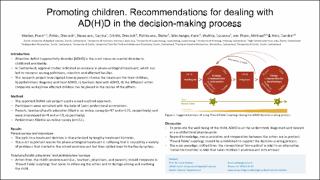Please use this identifier to cite or link to this item:
https://doi.org/10.21256/zhaw-21283| Publication type: | Conference poster |
| Type of review: | Peer review (abstract) |
| Title: | Promoting children : recommendations for dealing with AD(H)D in the decision-making process |
| Authors: | Wieber, Frank Robin, Dominik Neumann, Sascha Schöbi, Dominik Rüttimann, Dieter Wimberger, Karin Walitza, Susanne von Rhein, Michael Hotz, Sandra |
| et. al: | No |
| DOI: | 10.21256/zhaw-21283 |
| Conference details: | 16th World Congress on Public Health (WCPH), online, 12-16 October 2020 |
| Issue Date: | Oct-2020 |
| Publisher / Ed. Institution: | ZHAW Zürcher Hochschule für Angewandte Wissenschaften |
| Language: | English |
| Subjects: | Attention deficit hyperactivity disorder (ADHD); Round-table meetings; Mental disorder; Child and adolescent health; Decision-making; Treatment decision |
| Subject (DDC): | 615: Pharmacology and therapeutics 618.92: Pediatrics |
| Abstract: | Attention deficit hyperactivity disorder (ADHD) is the most common mental disorder in childhood worldwide. In Switzerland, regional studies indicated an increase in pharmacological treatment, which has led to concerns among politicians, scientists and affected families. This research project investigated how parents choose the treatment for their children, how pediatricians diagnose and treat ADHD, how teachers deal with ADHD, how the different actors cooperate and, most importantly, how affected children can be placed in the center of the efforts. The project used a mixed-method approach. Participants in Switzerland were recruited with the help of professional associations. Parents and teachers/health educators filled in an online survey (n=87 and n=125, respectively) and were interviewed (n=8 and n=10, respectively). Pediatricians filled in an online survey (n=223). The analysis of the parent survey showed that the path to a treatment decision is characterized by lengthy treatment histories. As most important reason for pharmacological treatment, parents reported the suffering, which manifested itself in a variety of problems that started in the school environment but then spilled over to the family system. As central finding from the responses of teachers/health educators and pediatricians, actors from the child's environment (i.e., teachers, physicians, and parents) should cooperate in "round table" meetings that serve to informing the actors and to destigmatizing and involving the child. To promote the well-being of the child, ADHD must be understood, diagnosed and treated as a multifactorial phenomenon. In addition to knowledge, communication and cooperation between the actors are important. The data also suggest a paradigm shift, whereby the conventional "bio-medical" model has already been replaced by an alternative "social construction" model that takes children's environment into account. |
| URI: | https://digitalcollection.zhaw.ch/handle/11475/21283 |
| Fulltext version: | Published version |
| License (according to publishing contract): | Licence according to publishing contract |
| Departement: | School of Health Sciences |
| Organisational Unit: | Institute of Public Health (IPH) |
| Appears in collections: | Publikationen Gesundheit |
Files in This Item:
| File | Description | Size | Format | |
|---|---|---|---|---|
| 2020_Wieber-Robin_etal_Promoting-children.pdf | 199.7 kB | Adobe PDF |  View/Open |
Show full item record
Wieber, F., Robin, D., Neumann, S., Schöbi, D., Rüttimann, D., Wimberger, K., Walitza, S., von Rhein, M., & Hotz, S. (2020, October). Promoting children : recommendations for dealing with AD(H)D in the decision-making process. 16th World Congress on Public Health (WCPH), Online, 12-16 October 2020. https://doi.org/10.21256/zhaw-21283
Wieber, F. et al. (2020) ‘Promoting children : recommendations for dealing with AD(H)D in the decision-making process’, in 16th World Congress on Public Health (WCPH), online, 12-16 October 2020. ZHAW Zürcher Hochschule für Angewandte Wissenschaften. Available at: https://doi.org/10.21256/zhaw-21283.
F. Wieber et al., “Promoting children : recommendations for dealing with AD(H)D in the decision-making process,” in 16th World Congress on Public Health (WCPH), online, 12-16 October 2020, Oct. 2020. doi: 10.21256/zhaw-21283.
WIEBER, Frank, Dominik ROBIN, Sascha NEUMANN, Dominik SCHÖBI, Dieter RÜTTIMANN, Karin WIMBERGER, Susanne WALITZA, Michael VON RHEIN und Sandra HOTZ, 2020. Promoting children : recommendations for dealing with AD(H)D in the decision-making process. In: 16th World Congress on Public Health (WCPH), online, 12-16 October 2020. Conference poster. ZHAW Zürcher Hochschule für Angewandte Wissenschaften. Oktober 2020
Wieber, Frank, Dominik Robin, Sascha Neumann, Dominik Schöbi, Dieter Rüttimann, Karin Wimberger, Susanne Walitza, Michael von Rhein, and Sandra Hotz. 2020. “Promoting Children : Recommendations for Dealing with AD(H)D in the Decision-Making Process.” Conference poster. In 16th World Congress on Public Health (WCPH), Online, 12-16 October 2020. ZHAW Zürcher Hochschule für Angewandte Wissenschaften. https://doi.org/10.21256/zhaw-21283.
Wieber, Frank, et al. “Promoting Children : Recommendations for Dealing with AD(H)D in the Decision-Making Process.” 16th World Congress on Public Health (WCPH), Online, 12-16 October 2020, ZHAW Zürcher Hochschule für Angewandte Wissenschaften, 2020, https://doi.org/10.21256/zhaw-21283.
Items in DSpace are protected by copyright, with all rights reserved, unless otherwise indicated.